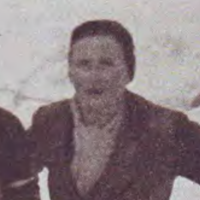Gerda Paumgarten
|
Gerda Paumgarten |
||||||||||||||||

|
||||||||||||||||
| nation |
|
|||||||||||||||
| birthday | February 4, 1907 | |||||||||||||||
| place of birth | Graz | |||||||||||||||
| date of death | January 1, 2000 | |||||||||||||||
| Place of death | Vienna | |||||||||||||||
| Career | ||||||||||||||||
|---|---|---|---|---|---|---|---|---|---|---|---|---|---|---|---|---|
| discipline | Slalom, giant slalom, downhill, combination |
|||||||||||||||
| society | Ski Club Arlberg | |||||||||||||||
| End of career | 1938 | |||||||||||||||
| Medal table | ||||||||||||||||
|
||||||||||||||||
|
||||||||||||||||
Gerda Countess Paumgarten-Hohenschwangau (born February 4, 1907 in Graz , † January 1, 2000 in Vienna ) was an Austrian ski racer . She became the slalom world champion in 1936 , won a total of four medals at world championships and won several international races.
Career
Paumgarten learned to ski at the age of seven, her older brothers Fridtjof and Harald were also skiers. Since she soon no longer had a serious competitor in the girls' races, she preferred to compete with the boys. In the winter months she often stayed on her father's property in St. Anton am Arlberg . Her first international competition was the 1932 World Championship in Cortina d'Ampezzo , where she came seventh in the downhill.
At the World Ski Championships in Innsbruck in 1933 , she won silver in the combined classification and bronze in downhill skiing . As a member of the Arlberg Ski Club , she passed the state-approved ski instructor exam in 1933. Due to the domestic political events in Austria ( February Uprising ), she had to forego participating in the World Cup in St. Moritz in 1934 . In the same winter, however, she won the downhill and slalom at the French championships in Luchon . In 1935 Paumgarten rarely took part in international competitions, but worked mainly as a ski instructor. As a result, she was excluded from participation in the 1936 Winter Olympics in Garmisch-Partenkirchen because of the strict amateur rules .
However , she took part in the 1936 World Ski Championships , which took place again in Innsbruck. The world championship at that time was actually a kind of "counter event", since a large number of runners were not allowed to take part in the Olympic Games in Garmisch-Partenkirchen because of the amateur rules. In the descent on Patscherkofel she fell and only reached fifth place, which meant she had no chance of winning the combined classification. However , she won the gold medal in the slalom on the Mutterer Alm . After the first run she was still in third place. The superior best time in the second run was enough for the victory and also for the bronze medal in the combination.
In 1936 Gerda Paumgarten also won the slalom and the combination at the prestigious Arlberg-Kandahar races in St. Anton and in 1937 a giant slalom in Davos . After her resignation in 1938, she emigrated to the USA , where her brother Harald had already moved a few years earlier. After the USA entered the war, she was interned for a short time . Paumgarten again worked as a ski instructor and contributed to the spread of alpine skiing in North America. After the war she returned to St. Anton; she spent the last years of her life in Vienna. She was buried in the Neustift cemetery .
Sporting successes
World championships
- Cortina d'Ampezzo 1932 : 7th descent, 10th combination, 11th slalom
- Innsbruck 1933 : 2nd combination, 3rd descent, 6th slalom
- Innsbruck 1936 : 1st slalom, 3rd combination, 5th descent
Web links
- Gerda Paumgarten in the database of the International Ski Association (English)
- Gerda Paumgarten in the database of Ski-DB (English)
| personal data | |
|---|---|
| SURNAME | Paumgarten, Gerda |
| ALTERNATIVE NAMES | Gerda Countess Paumgarten-Hohenschwangau |
| BRIEF DESCRIPTION | Austrian ski racer |
| DATE OF BIRTH | February 4, 1907 |
| PLACE OF BIRTH | Graz |
| DATE OF DEATH | January 1, 2000 |
| Place of death | Vienna |